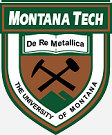Difference between revisions of "More computing resources"
From Montana Tech High Performance Computing
| (4 intermediate revisions by the same user not shown) | |||
| Line 4: | Line 4: | ||
"The XSEDE ecosystem encompasses a broad portfolio of resources operated by members of the XSEDE Service Provider Forum. These resources include multi-core and many-core high-performance computing (HPC) systems, distributed high-throughput computing (HTC) environments, visualization and data analysis systems, large-memory systems, data storage, and cloud systems. " | "The XSEDE ecosystem encompasses a broad portfolio of resources operated by members of the XSEDE Service Provider Forum. These resources include multi-core and many-core high-performance computing (HPC) systems, distributed high-throughput computing (HTC) environments, visualization and data analysis systems, large-memory systems, data storage, and cloud systems. " | ||
| − | + | For a list of XSEDE resources: [https://www.xsede.org/ecosystem/resources] | |
| + | === XSEDE Campus Champion === | ||
| + | Montana Tech has joined the XSEDE's Campus Champions Program[https://www.xsede.org/community-engagement/campus-champions]. With the XSEDE Campus Cahmpion Program, you can: | ||
| + | * evaluate or benchmark your project on various XSEDE resources through our campus champion allocation. | ||
| + | * get assistance for applying allocations on XSEDE resources. | ||
| + | * get help on using XSEDE resources. | ||
| − | == CISL == | + | Our campus champion allocations provide test access at: |
| − | CISL, The Computational and Information Systems Laboratory, offers computing resources[https://www2.cisl.ucar.edu/user-support/allocations] to university researchers with some restrictions: | + | * STAMPEDE2 at Texas Advanced Computing Center |
| + | * Bridges at Pittsburgh Supercomputing Center | ||
| + | * Comet at San Diego Supercomputer Center | ||
| + | * Jetstream at Indiana University | ||
| + | * Open Science Grid | ||
| + | |||
| + | |||
| + | |||
| + | |||
| + | == NCAR/CISL == | ||
| + | NCAR, National Center for Atmospheric Research through CISL, The Computational and Information Systems Laboratory, offers computing resources[https://www2.cisl.ucar.edu/user-support/allocations] to university researchers with some restrictions: | ||
*The work must be within the atmospheric, climate, and related science | *The work must be within the atmospheric, climate, and related science | ||
| − | *Allocations must either be supported by an NSF reward; or to | + | *Allocations must either be supported by an NSF reward; or to a grad student, post-doc or new faculty without a funded science award |
Latest revision as of 15:06, 2 April 2019
XSEDE
Funded by NSF, XSEDE[1] stands for The Extreme Science and Engineering Discovery Environment. Per its website, "XSEDE is a single virtual system that scientists can use to interactively share computing resources, data and expertise."
"The XSEDE ecosystem encompasses a broad portfolio of resources operated by members of the XSEDE Service Provider Forum. These resources include multi-core and many-core high-performance computing (HPC) systems, distributed high-throughput computing (HTC) environments, visualization and data analysis systems, large-memory systems, data storage, and cloud systems. "
For a list of XSEDE resources: [2]
XSEDE Campus Champion
Montana Tech has joined the XSEDE's Campus Champions Program[3]. With the XSEDE Campus Cahmpion Program, you can:
- evaluate or benchmark your project on various XSEDE resources through our campus champion allocation.
- get assistance for applying allocations on XSEDE resources.
- get help on using XSEDE resources.
Our campus champion allocations provide test access at:
- STAMPEDE2 at Texas Advanced Computing Center
- Bridges at Pittsburgh Supercomputing Center
- Comet at San Diego Supercomputer Center
- Jetstream at Indiana University
- Open Science Grid
NCAR/CISL
NCAR, National Center for Atmospheric Research through CISL, The Computational and Information Systems Laboratory, offers computing resources[4] to university researchers with some restrictions:
- The work must be within the atmospheric, climate, and related science
- Allocations must either be supported by an NSF reward; or to a grad student, post-doc or new faculty without a funded science award
